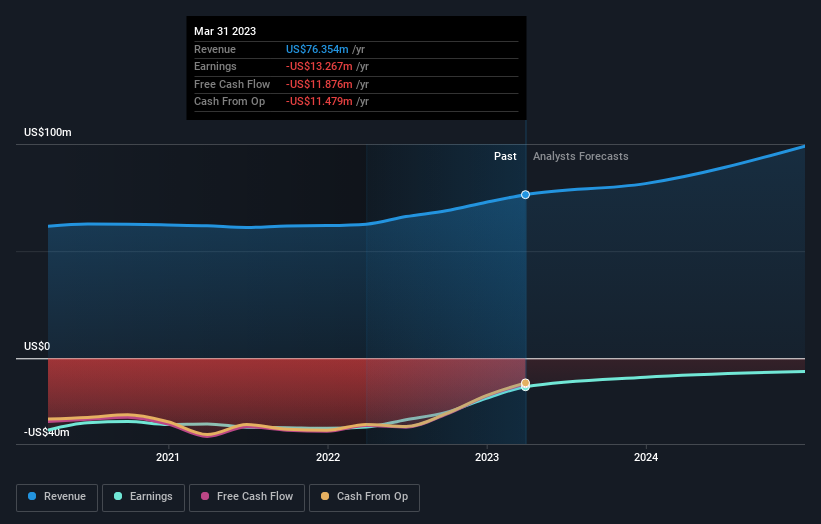Institutions own 6.9% of Rockwell Medical, Inc. (NASDAQ:RMTI) shares but individual investors control 41% of the company
Key Insights
The considerable ownership by individual investors in Rockwell Medical indicates that they collectively have a greater say in management and business strategy
A total of 25 investors have a majority stake in the company with 15% ownership
Past performance of a company along with ownership data serve to give a strong idea about prospects for a business
Every investor in Rockwell Medical, Inc. (NASDAQ:RMTI) should be aware of the most powerful shareholder groups. We can see that individual investors own the lion's share in the company with 41% ownership. Put another way, the group faces the maximum upside potential (or downside risk).
Institutions, on the other hand, account for 6.9% of the company's stockholders. Large companies usually have institutions as shareholders, and we usually see insiders owning shares in smaller companies.
Let's delve deeper into each type of owner of Rockwell Medical, beginning with the chart below.
Check out our latest analysis for Rockwell Medical
What Does The Institutional Ownership Tell Us About Rockwell Medical?
Institutions typically measure themselves against a benchmark when reporting to their own investors, so they often become more enthusiastic about a stock once it's included in a major index. We would expect most companies to have some institutions on the register, especially if they are growing.
As you can see, institutional investors have a fair amount of stake in Rockwell Medical. This implies the analysts working for those institutions have looked at the stock and they like it. But just like anyone else, they could be wrong. When multiple institutions own a stock, there's always a risk that they are in a 'crowded trade'. When such a trade goes wrong, multiple parties may compete to sell stock fast. This risk is higher in a company without a history of growth. You can see Rockwell Medical's historic earnings and revenue below, but keep in mind there's always more to the story.
We note that hedge funds don't have a meaningful investment in Rockwell Medical. Looking at our data, we can see that the largest shareholder is Richmond Brothers, Inc. with 3.3% of shares outstanding. Meanwhile, the second and third largest shareholders, hold 2.6% and 2.4%, of the shares outstanding, respectively.
On studying our ownership data, we found that 25 of the top shareholders collectively own less than 50% of the share register, implying that no single individual has a majority interest.
While it makes sense to study institutional ownership data for a company, it also makes sense to study analyst sentiments to know which way the wind is blowing. While there is some analyst coverage, the company is probably not widely covered. So it could gain more attention, down the track.
Insider Ownership Of Rockwell Medical
While the precise definition of an insider can be subjective, almost everyone considers board members to be insiders. Management ultimately answers to the board. However, it is not uncommon for managers to be executive board members, especially if they are a founder or the CEO.
Insider ownership is positive when it signals leadership are thinking like the true owners of the company. However, high insider ownership can also give immense power to a small group within the company. This can be negative in some circumstances.
Our information suggests that Rockwell Medical, Inc. insiders own under 1% of the company. It has a market capitalization of just US$163m, and the board has only US$615k worth of shares in their own names. Many investors in smaller companies prefer to see the board more heavily invested. You can click here to see if those insiders have been buying or selling.
General Public Ownership
With a 41% ownership, the general public, mostly comprising of individual investors, have some degree of sway over Rockwell Medical. While this size of ownership may not be enough to sway a policy decision in their favour, they can still make a collective impact on company policies.
Next Steps:
It's always worth thinking about the different groups who own shares in a company. But to understand Rockwell Medical better, we need to consider many other factors. For instance, we've identified 3 warning signs for Rockwell Medical (2 are potentially serious) that you should be aware of.
If you are like me, you may want to think about whether this company will grow or shrink. Luckily, you can check this free report showing analyst forecasts for its future.
NB: Figures in this article are calculated using data from the last twelve months, which refer to the 12-month period ending on the last date of the month the financial statement is dated. This may not be consistent with full year annual report figures.
Have feedback on this article? Concerned about the content? Get in touch with us directly. Alternatively, email editorial-team (at) simplywallst.com.
This article by Simply Wall St is general in nature. We provide commentary based on historical data and analyst forecasts only using an unbiased methodology and our articles are not intended to be financial advice. It does not constitute a recommendation to buy or sell any stock, and does not take account of your objectives, or your financial situation. We aim to bring you long-term focused analysis driven by fundamental data. Note that our analysis may not factor in the latest price-sensitive company announcements or qualitative material. Simply Wall St has no position in any stocks mentioned.
Join A Paid User Research Session
You’ll receive a US$30 Amazon Gift card for 1 hour of your time while helping us build better investing tools for the individual investors like yourself. Sign up here


